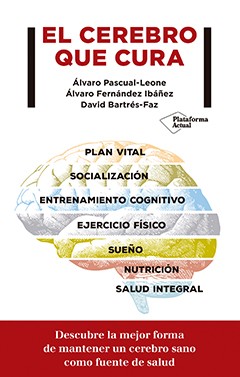Mens sana in corpore sano…and vice versa (interview in Spanish)
 ___
___
“La soledad es tan perjudicial para la salud como fumar 15 cigarrillos al día” (La Vanguardia):
“Respecto al peso total del cuerpo, más bien pesa poco. Unos 1.400 gramos. Y sus dimensiones tampoco son para tirar cohetes: ronda los 1.300 centímetros cúbicos. Pero a pesar de su reducido tamaño, su repercusión sobre el ser humano es incalculable. En él reside, ni más ni menos, que la mente y la conciencia del individuo. Sí, hablamos del cerebro, objeto de estudio de muchos científicos y que a día de hoy sigue escondiendo infinidad de secretos. Álvaro Pascual-Leone (Valencia, 1961) no cesa en su empeño de continuar revelando alguno de ellos. Este neurólogo y catedrático de la Universidad de Harvard acaba de publicar, junto con los investigadores Álvaro Fernández Ibáñez y David Bartrés-Faz, El cerebro que cura (Plataforma Editorial), una obra en la que explica algunos de los resultados obtenidos en el estudio Barcelona Brain Health Initiative que él dirige y que está promovido por el Institut Guttmann con el apoyo de la Obra Social “La Caixa” …
Ustedes defienden que nuestro cerebro tiene la capacidad de curarnos. ¿En qué medida?
El título del libro, ‘El cerebro que cura’, pretende destacar, en primer lugar, que lo que sabemos desde los romanos, que un cuerpo sano promueve una mente sana, es cierto. Pero además, que lo contrario también es verdad: el cerebro sano promueve la salud, un funcionamiento mejor de los órganos. La idea crítica es que nuestro cerebro dedica más de la mitad del tiempo no a permitirnos relacionarnos con los otros y con el mundo que nos rodea, sino a monitorizar lo que está pasando en nuestro cuerpo y a actuar sobre ello. Y esa actuación puede ser positiva, pero también negativa, puede causar enfermedad.
Le sigo.
Si tú tienes un cerebro que funciona mal, al final el resto de tu cuerpo funciona mal. Y en términos anecdóticos y descriptivos se sabe que personas que tienen ansiedad, depresión, enfermedades varias del cerebro, tiene también más riesgo de úlcera de estómago, dolores, problemas crónicos… este el efecto negativo.
¿Y el positivo?
Si tú tienes una razón de ser potente, prestas atención a los buenos hábitos de vida que promueven tu buena salud cerebral, entonces, aunque tengas hipertensión, o diabetes, o incluso un cáncer, estás mejor, porque el cerebro promueve ese beneficio. En último término, la pregunta de si un cerebro sano puede curarte el cáncer o una infección se desconoce, la evidencia es muy pobre en este momento. Pero sí que sabemos que si tienes un cerebro sano y practicas todos los hábitos que hemos destacado, el riesgo de contraer la infección es menor, y la capacidad de sobrellevar el cáncer es mucho mejor.”
–> Siga leyendo “La soledad es tan perjudicial para la salud como fumar 15 cigarrillos al día” en La Vanguardia.
_________________________________________________
 Cómo comprar el libro:
Cómo comprar el libro:
–> El Cerebro Que Cura: Descubre la mejor forma de mantener un cerebro sano como fuente de salud
(Disponible en tapa blanda y en Kindle en
EEUU, España, México y múltiples países)


